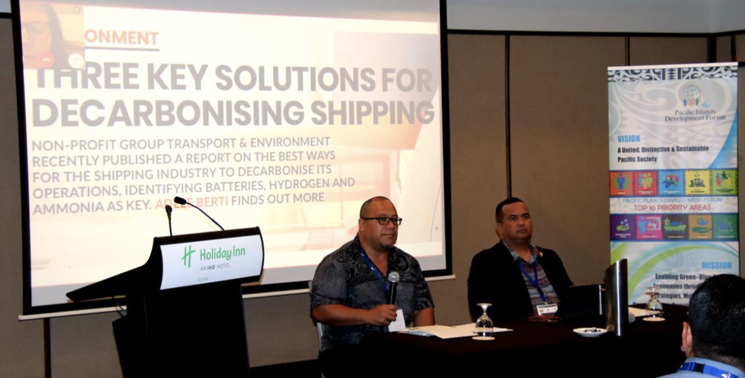

As Pacific high ambition pressure at IMO for a paradigm shift for international shipping decarbonization builds and we inch closer to a real price on shipping emissions, we turn back to how to organize a parallel shift for our domestic fleets.
In our latest technical working paper, MCST suggests alternative narratives for the governance, financing and technology transition pathways for the Pacific Blue Shipping Partnership.
The speed and scale of transition required to implement our country’s NDC’s domestic maritime targets are unprecedented. It demands a complete revolution in technology and a paradigm shift in fleet management and operations as well as the financial investment and program delivery away from existing structures. A dedicated bespoke solution is required.
Our research considers a collective country approach with governance via a Ministerial Council of participating countries the most appropriate and efficient structure.
Central to PBSP’s design is the need for a country-owned and -driven program. In essence PBSP is a formal agreement between a number of states to:

For more information on the Pacific Blue Shipping Partnership,
The Pacific Blue Shipping Partnership is an ambitious country-driven initiative for a large-scale blended finance investment to catalyse a multi-country transition to sustainable, resilient, and low carbon shipping. The PBSP targets domestic shipping to zero carbon by 2050 with a 40% reduction by 2030.
MCST, along with multiple regional and international partners, is providing technical support to the project.


Current evidence highlights the significant and enduring potential benefits (social, economic, and environmental) of a rapid transition to sustainable, resilient and low-carbon sea transport in PICs. Climate change is an urgent threat to the maritime transport sector (and sustainable development generally), which can be addressed in part through efforts to decarbonise and adapt the sector in accordance with the 2015 Paris Agreement supported by the Talanoa Dialogue and other platforms.
PICs have been central to the work of the International Maritime Organisation (IMO) which in April 2018 set an initial decarbonisation target for international shipping of at least 50% by 2050. This target is a positive step but remains inconsistent with the level of ambition required to limit climate change to below 1.5°C or even 2°C. Fiji and RMI are asking the region to commit to an initial emissions reduction target for Pacific shipping of 40% by 2030, and full decarbonisation by 2050.
Transportation and mobility are cross-cutting issues central to the sustainable development of PICs. Domestic ferries and inter-PIC transport vessels are commonly old, fuel inefficient and unsafe, functioning as critical links between remote destinations. Shipping within and between PICs is the most expensive per unit distance and per capita in the world. PICs are precariously dependent on imported fossil fuels raising critical issues of fuel price vulnerability and security of supply. A substantive investment is needed immediately if a transformation to more appropriate, clean and affordable shipping—domestic and international—is to be effected at scale and speed across the region.
A regional transition to sustainable, resilient and decarbonised sea transport will require substantial investment. In comparison to other major economic sectors, investment in the sustainable development (including climate change mitigation and adaptation) of sea transport for PICs has been extremely limited to date.
Large-scale financial investment in sustainable sea transport will require input from diverse sources, following a blended finance approach, catalysed in the short and medium term by both bilateral donor assistance, and the issuance of a guaranteed Blue Bond. A key subsequent step will be the development of proposals for a large regional investment (in the order of USD 100 million) from the GCF. This would allow for an integrated programme portfolio of both grant and revolving loan modalities targeting public and private sectors and all scales of shipping from village to inter-country. The cost of this financing could be significantly reduced by guarantees, grants, or highly concessional instruments supported by development partners.
The investment of USD 2 billion into the electricity sector under the Pacific Energy Summits since 2012 provides a precedent for such international cooperation. A blended finance approach for shipping would be consistent with the 2030 Agenda for Sustainable Development, Paris Agreement on Climate Change regional NDCs, the SAMOA Pathway, and Framework for Resilient Development in the Pacific. Support for this approach has been well signalled by the UN agencies (UNCTAD, WFP, UNESCO, UNESCAP) and regional agencies including USP, SPC and PIFS (SIS secretariat).
Two working groups, Technical and Finance, have been established under the coordinating committee co-hosted by Fiji and RMI.
Fiji and RMI will issue a “Save the Date” notice shortly for a workshop of decision-makers of relevant PICs finance and transport ministries and major partners to be held first quarter 2020. This is being organised to draft an Initiative Roadmap, discuss Working Papers drafted by the Technical and Finance Working Groups and, most importantly, work towards finalizing country commitments to the PBSP.
Links & Resources
Please find additional coverage on the announcement of the project linked below: